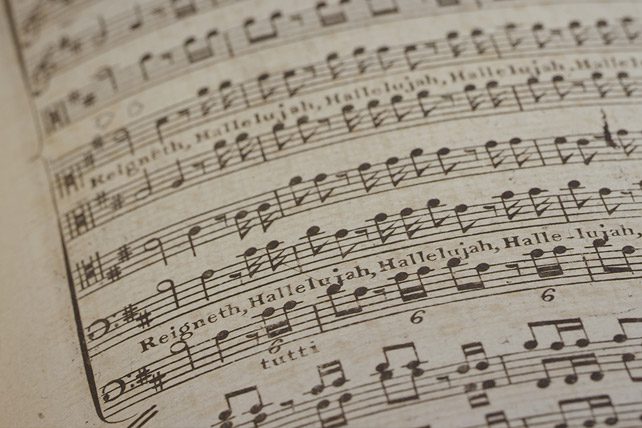George Frederic Handel (1685-1759) was living in London when he received an invitation from the Lord Lieutenant of Dublin in 1741 to write a new oratorio. The work was called Messiah. It was arranged in three parts: the Christmas story, the Easter story, and the spread of Christianity. What was unusual about this oratorio was its language. Breaking with tradition, Handel wrote every word of his oratorio, not in Italian, German, or Latin, but in English. Well, every word except for one word, which was left in its original language and not translated into English. For millennia this word has been used by people of all languages in the original Hebrew. It is the word, Hallelujah. People all over the world sing hallelujah.
The Hallelujah Chorus in Handel’s Messiah appears at the end of part two, at the resurrection of Christ. It was at this moment in an early performance that a tradition was born. The London premiere was held at the Covent Garden Theatre on March 23, 1743.
King George II was attending the performance and as the resurrection was announced by the commencement of the Hallelujah Chorus, he suddenly rose to his feet, apparently moved by the moment, or out of respect for the subject matter, or more likely he was just needing to get the circulation flowing in his legs.
Regardless of the reason, he stood up, and according to protocol when the king stands up everyone present must stand up too. Nearly three centuries have passed since that day, but the tradition remains that the opening bars of the Hallelujah Chorus brings people to their feet.
In Psalm 135 we’ll see:
How Psalm 135 Can Inspire You to Sing Hallelujah
1. The Call to Praise
Praise the Lord! Praise the name of the Lord, give praise, O servants of the Lord, (Psalm 135:1)
The Psalm opens with a command that is familiar to anyone who has ever read a Psalm: Praise the LORD! This is one of the most ubiquitous calls to worship in the Book of Psalms.
Praise the LORD is the Hebrew word Hallelujah.
Hallel means praise, worship, magnify.
U means “us” or “we.”
Jah is a common abbreviation for the name “Yahweh.”
So Hallel-u-jah, means “praise, us, Yahweh.” Or “Let us praise Yahweh.” Praise the LORD.
At its most basic, praising God is acknowledging his name, uttering his name as the cause or reason for anything we have in our lives.
We need to cultivate a habit of constantly praising God for all he does for us. Acknowledging that what we have from food, to family, from laughter to life and breath, groceries and saving grace, is all of God’s goodness to us.
If you aren’t saying hallelujah or “praise God” or at least PTL in your texts several times a day, it is because you are just not paying attention.
Don’t be like the kid on Christmas Day who unwraps a gift and forgets to hug the one who gave it.
Be the one in your world who acknowledges what God does for you.
Our highest calling as humans is to praise God. But why?
2. The Cause for Praise
God’s sovereignty will cause us to sing hallelujah.
6 Whatever the Lord pleases, he does, in heaven and on earth, in the seas and all deeps.
This is one of the most practical, comforting, and encouraging doctrines in Scripture and attributes of God: he is sovereign. He is in charge. The seas and the deeps represent all that is chaotic, unknown, and fearful for the Israelites. The Psalmist says God is in charge in the midst of all that.
The discoveries of science will cause us to sing hallelujah.
7 He it is who makes the clouds rise at the end of the earth, who makes lightnings for the rain and brings forth the wind from his storehouses.
A cause for praise is that God is in control of nature, weather, the water cycle, geography. Have you ever stood in a storm, felt the thunder vibrate in your bones, feel the wind whip around your face, and see the sheets of electric fire bolting from heaven to earth in terrifying scars of light across the face of the sky? It’s breathtaking. It’s mesmerizing. It’s art.
Our God is the creator of science.
We sing Hallelujuah because God leads us to safety:
8 He it was who struck down the firstborn of Egypt, both of man and of beast; 9 who in your midst, O Egypt, sent signs and wonders against Pharaoh and all his servants; 10 who struck down many nations and killed mighty kings, 11 Sihon, king of the Amorites, and Og, king of Bashan, and all the kingdoms of Canaan, 12 and gave their land as a heritage, a heritage to his people Israel.13 Your name, O Lord, endures forever, your renown, O Lord, throughout all ages. 14 For the Lord will vindicate his people and have compassion on his servants.

